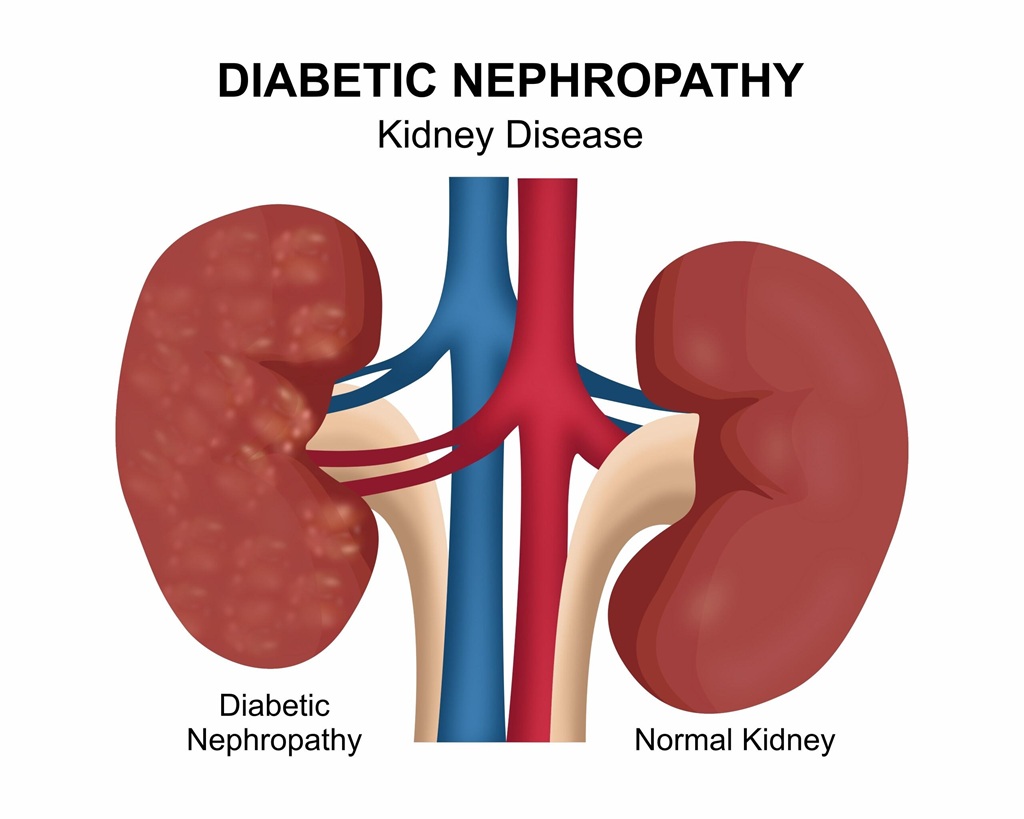Diabetic nephropathy, also called diabetic kidney disease, is a serious complication of diabetes that affects the kidneys. It can lead to kidney damage and, if untreated, progress to kidney failure. With early diagnosis and proper management, it is possible to slow its progression and maintain kidney function.
Here’s a guide on what diabetic nephropathy is, which includes its causes, symptoms, and prevention strategies and treatment options.

Diabetic nephropathy is a condition where prolonged high blood sugar levels lead to damage in the kidneys. These essential organs play a key role in filtering waste, balancing fluids, and managing blood pressure.
Over time, this condition can advance to chronic kidney disease or even kidney failure, and need dialysis or a transplant. Managing blood sugar levels effectively is crucial to minimizing the risk of kidney damage.
Early stages of Diabetic nephropathy may not show any noticeable symptoms. This is why regular screening is essential. As the condition progresses, you may notice:
Recognizing these diabetic nephropathy symptoms early can help in seeking timely treatment.
While anyone with diabetes is at risk of kidney damage, certain factors increase the likelihood of developing the condition:
Understanding these risk factors can aid in taking preventive measures to protect your kidneys.
Diagnosing diabetic nephropathy involves a combination of tests to assess kidney function and detect early damage. These include:
Regular screening is vital for individuals with diabetes to catch any signs of diabetic kidney disease early.
Effective diabetic nephropathy treatment focuses on managing symptoms, slowing disease progression, and preventing complications. Here are the primary treatment approaches:
Collaborating with healthcare professionals ensures a tailored treatment plan to suit individual needs.
Prevention is the most effective way to protect your kidneys from diabetes-related damage. Here are some actionable steps:
Preventing kidney disease with diabetes involves a proactive approach to overall health management.
Living with diabetic nephropathy requires a shift in lifestyle and mindset. Here are some tips:
Small, consistent changes can significantly improve quality of life and slow disease progression.
Diabetic nephropathy is a significant diabetes-related complication that demands prompt awareness, early detection, and proper management. By understanding the signs of diabetic kidney disease and taking steps to control blood sugar and blood pressure, you can protect your kidneys and enhance your quality of life.
If you’re seeking expert care for diabetic nephropathy or related conditions, SPARSH Hospitals, a trusted Endocrinology and Diabetology Hospital in Bangalore, offers comprehensive care tailored to your needs. Their team of specialists ensures you receive the best guidance and treatment for managing diabetes-related kidney complications.
To confirm diabetic nephropathy, doctors typically rely on a combination of tests. These include urine tests to check for protein (albuminuria), blood tests to assess kidney function (creatinine levels), and imaging studies. Monitoring kidney function over time, along with a detailed review of your medical history, can help confirm the diagnosis.
Managing diabetic nephropathy effectively involves controlling blood sugar levels and blood pressure. Adopting a kidney-friendly diet, staying physically active, avoiding smoking, and reducing salt and protein intake can slow its progression. Medications, such as ACE inhibitors or angiotensin receptor blockers (ARBs), may also be prescribed to protect kidney function.
While nephropathy is not fully curable, it is possible to slow its progression significantly with proper management. Early detection and treatment can help protect kidney function, prevent complications, and reduce further damage to the kidneys.
Recovery from diabetic nephropathy depends on the stage of the disease. In its early stages, kidney damage can sometimes be reversed or stabilized with effective treatment. However, in more advanced stages, the focus shifts to managing symptoms and preventing further kidney damage.
Categories: Nephrology
Everything You Need To Know About Diabetes Nephropathy is available for appointments. Please fill the below form to book an appointment.
Unlock the door to exceptional healthcare, book an appointment with SPARSH Hospital and let your journey to wellness begin.